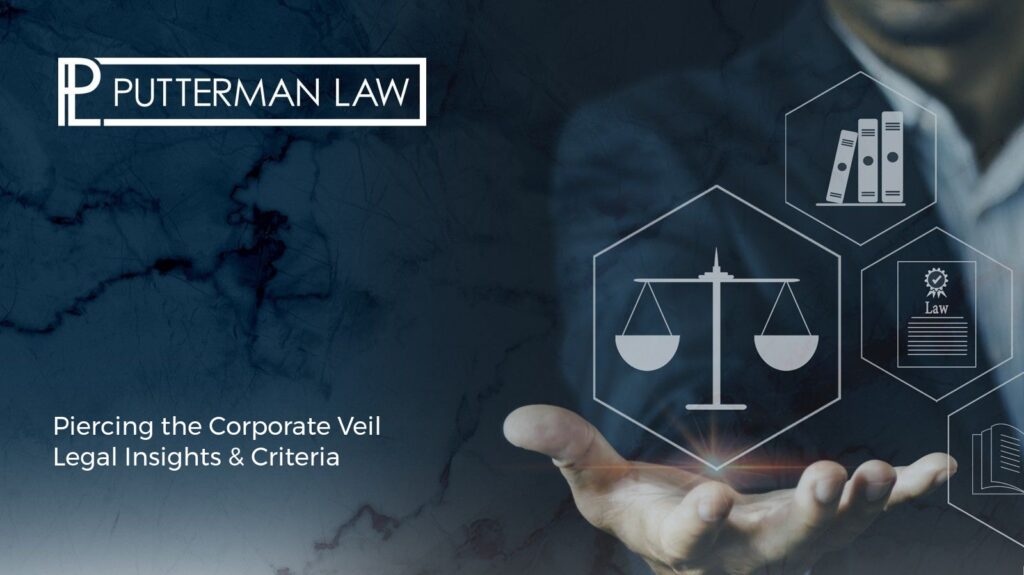At Putterman Law, we understand that navigating the intricacies of corporate law can be challenging. One particularly complex area is the concept of piercing the corporate veil. This doctrine allows courts to hold individual shareholders or directors personally liable for the company’s actions under specific circumstances. This introduction provides a comprehensive look into what piercing the corporate veil entails and its significance.
Understanding the Corporate Veil Concept
The corporate veil is a legal principle that separates the identity of a corporation from its shareholders or directors. This separation is fundamental in business law, as it offers protection to those who own or manage the company by limiting their liability to the amount they have invested in the corporation. However, this protection is not absolute. In certain situations, courts may decide to pierce the corporate veil, targeting the personal assets of shareholders or directors to satisfy corporate debts or obligations.
Legal Criteria for Piercing the Corporate Veil
When it comes to piercing the corporate veil, the legal criteria must be meticulously demonstrated. Courts generally use a set of established factors to determine whether the corporate veil can be pierced. These factors include:
- Comingling of Personal and Corporate Funds
- Undercapitalization of the Corporation
- Failure to Follow Corporate Formalities
- Use of the Corporation for Fraudulent Purposes
First, comingling of personal and corporate funds can blur the line between the individual and the entity, suggesting that the individual treats the corporation as an extension of themselves. Second, undercapitalization at inception, or failure to invest sufficient capital to cover potential liabilities, also raises red flags. Third, failing to follow corporate formalities, such as proper documentation of meetings and resolutions, weakens the corporation’s standing as an independent entity. Lastly, using the corporation for fraudulent purposes can justify veil piercing to prevent injustices or abuses.
Common Scenarios Leading to Veil Piercing
Common scenarios of veil piercing include fraudulent behavior, rampant disregard for corporate formalities, and extreme undercapitalization. Plaintiffs might also encounter businesses where comingling funds creates a murky financial picture. Additionally, courts can pierce the corporate veil in instances where business owners siphon off assets, leaving the corporation insolvent and unable to meet its obligations.
- Fraudulent Conduct by Owners
- Disregard for Corporate Formalities
- Extreme Undercapitalization
- Comingling of Entity and Personal Assets
- Siphoning off Corporate Assets
Implications for Business Owners
Understanding the concept of piercing the corporate veil is crucial for business owners. While the corporate structure generally offers protection from personal liability, mismanagement or fraudulent practices can lead to personal assets becoming vulnerable. Owners must be conscientious in their business operations, ensuring that they uphold the principles of transparency and compliance with regulations.
Preventive Measures for Companies
To minimize the risk of the corporate veil being pierced, companies should maintain meticulous records, separate personal and business finances, and adhere to corporate formalities. Regular audits and legal consultations can also help recognize and address potential vulnerabilities before they become significant issues. By taking these precautions, companies can safeguard both their assets and their reputation.
Final Thoughts and Legal Disclaimers
It is paramount for businesses to consult with a legal professional to fully understand their obligations and the potential legal risks associated with their corporate activities. At Putterman Law, we are committed to offering comprehensive legal solutions that protect your interests and uphold the integrity of the corporate structure.
FAQs
What is piercing the corporate veil, and when does it apply?
Piercing the corporate veil occurs when a court disregards a company’s separate legal entity and holds its owners personally liable for business debts or obligations. It typically applies in cases of fraud, undercapitalization, or when the company is used to commit wrongdoing.
How can business owners protect themselves from piercing the corporate veil?
Business owners can protect themselves by maintaining proper corporate formalities, keeping personal and business finances separate, adequately capitalizing the company, and documenting all business decisions and transactions appropriately.
Can piercing the corporate veil impact a business owner’s personal assets?
Yes, if the corporate veil is pierced, business owners may be held personally liable for the company’s debts or legal obligations, putting personal assets such as homes, savings, and investments at risk.
What are some common mistakes that could lead to the corporate veil being pierced?
Common mistakes include commingling personal and business funds, failing to follow corporate formalities, undercapitalizing the business, and using the company to commit fraud or illegal acts.
How does Putterman Law assist clients in commercial litigation involving piercing the corporate veil?
Putterman Law provides experienced guidance in both defending against and pursuing claims involving piercing the corporate veil. Their attorneys help protect clients’ personal assets, navigate complex litigation, and provide strategic legal advice throughout the process.






